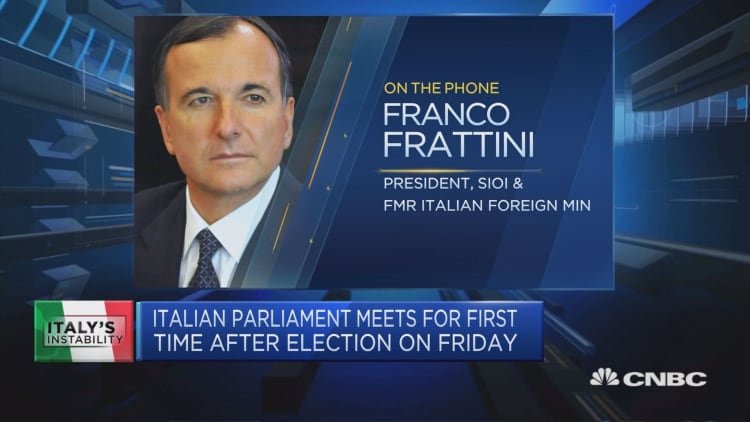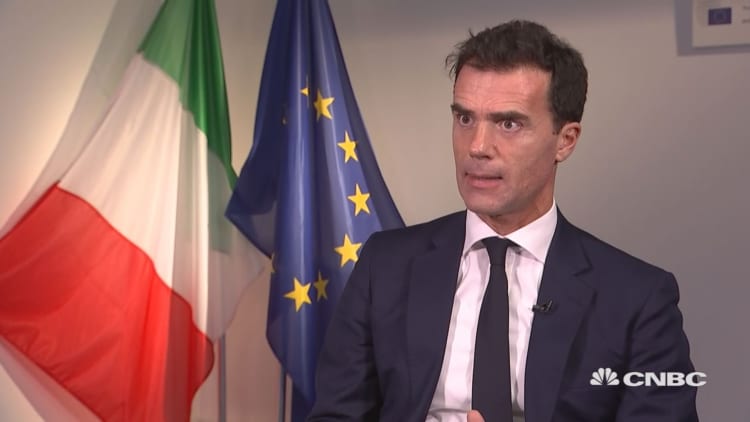Italy's parliament is convening for a vote on Friday that could pave the way for negotiations between rival parties to form a coalition government. But, as ever with Italian politics, there are plenty of obstacles to overcome.
The vote is aimed at electing speakers to both the upper and lower houses of parliament, the Senate and Chamber of Deputies respectively.
Italy's most popular single party — the Five Star Movement (M5S) — and the most popular coalition of center-right parties, including Lega and Silvio Berlusconi's Forza Italia, have discussed the possibility of each appointing a speaker of their choosing to one of the houses, although there are already disputes over this.
"The situation is evolving now and I hope that in the end an agreement will be found because it's absolutely necessary to move ahead... with negotiations for a new government," Franco Frattini, former foreign minister and president of the Italian Society for International Organization (SIOI) told CNBC on Thursday.

The current political stalemate follows an election on March 4 that led to a hung parliament, with no one party or coalition winning a majority of seats allowing it to govern alone.
The vote saw anti-establishment, populist parties like M5S and Lega do much better than expected, while traditional, long-standing ones, like the former ruling Democratic Party and Forza Italia, performed badly.
Horse-trading
Once speakers to both houses of parliament are elected, hopefully Friday, negotiations can begin to form a government — but that process will likely also to be protracted and could take weeks, if not more. The process will be overseen by Italian President Sergio Mattarella.
Frattini, who was foreign minister in two former cabinets under Berlusconi, was not worried about the formation of a coalition government.
"We're in very good hands with President Mattarella and I'm sure he'll be able to get this difficult situation under control... Stability is possible, provided that Mattarella promotes a good agreement (between the parties) based on tax reduction and cutting useless public spending where there is broad agreement," he said.
The largest win for a single party was claimed by M5S, with 32 percent of the vote, but the center-right coalition including Lega and Forza Italia was the largest coalition, with 37 percent.
Neither M5S nor the center-right bloc gained enough votes to govern alone, however. The former ruling Democratic Party fared badly in comparison, with 23 percent of the vote.
On Wednesday, the center-right coalition — which is made up of Lega (formerly Lega Nord), Forza Italia, the right-wing Fratelli d'Italia, and the smaller Noi con l'Italia — claimed the right to name the upper house speaker and said M5S should name the speaker in the lower house.
So far, M5S has opposed the center-right's choice of Paolo Romani for speaker of the upper house, however, meaning Friday's vote is far from clear cut.
Clashes
Still, Italy is no stranger to political stalemates and M5S and Lega have shown some willingness to at least talk about forming a government, although there are major differences over key policies.
For instance, M5S wants a universal basic income, which guarantees a minimum set of earnings for all, while the center-right coalition wants a flat income tax of 15 percent.
There are also frictions between political leaders, with M5S' Luigi Di Maio clashing repeatedly with Forza Italia's Silvio Berlusconi. So personalities are also likely to prove a sticking point.
In addition, old rivalries are at play. While the Democratic Party performed badly in the election, it nonetheless could have a decisive factor in the formation of a government, playing something of the role of "kingmaker," either choosing to support or oppose a proposed coalition government. It has previously shown an aversion to an anti-establishment M5S-led government, although the party is divided, with some members favoring a coalition.
Against this backdrop, political analysts did not expect the election of speakers Friday to provide any clarity on overcoming the deadlock created by the election.
"A possible deal over the speaker positions between the two populist forces that prevailed on March 4 — the Five Star Movement and the Northern League (Lega) – should not be regarded as a prelude to a possible joint governing arrangement," Wolfango Piccoli, co-president of Teneo Intelligence, said Tuesday.
The lack of visibility on a future government "is likely to persist for weeks and the outcome of the consultations that will start later this month remains highly uncertain," he added.
"Regardless, the election of the two speakers will constitute a first significant test for the cohesion of the center-right electoral bloc and the unity of the extremely-divided Partito Democratico (Democratic Party). This is important, given the fact that the arduous task of creating a working majority could be facilitated by eventual defections and a party split."
Patchy growth
The Italian Minister of State for EU Affairs, Sandro Gozi, told CNBC Thursday that growth is back for the country and there is also a consistent fall in unemployment. However, the Democratic Party politician said the wealth was, once again, not being spread around the country.
"The north is full steam ahead, at Germany standards, but the south is once again being excluded," he said.

Gozi said that his Democratic Party had fared poorly in elections because it had not managed to shake a perception that refugees from the Middle East and North Africa were flooding into Italy.
And on the proposed new coalition, Gozi said he hoped Italy would continue to have a strong role at the European level.
Markets relaxed
Used to political instability in Italy, markets remain sanguine about the lack of government. After all, Germany has itself only just formed a coalition government after months of political stalemate.
Italy's FTSE MIB has recovered from the sharp decline seen after the election result and is now trading higher than the days leading up to the election, despite the success of populist parties that could upset Italy's relationship with the rest of Europe.
Richard McGuire, Lyn Graham-Taylor and Matt Cairns, from Rabobank's global economics and markets research team, said in a note Wednesday: "Overall, the picture remains unclear as we remain in the very early stages of political negotiations.
"However, the market appears to be happy to trade 'no news is good news' while 'focusing on positive signs of any political developments that there are... rather than the negatives... while this lack of clarity remains."
- CNBC's Willem Marx contributed reporting to this story.


